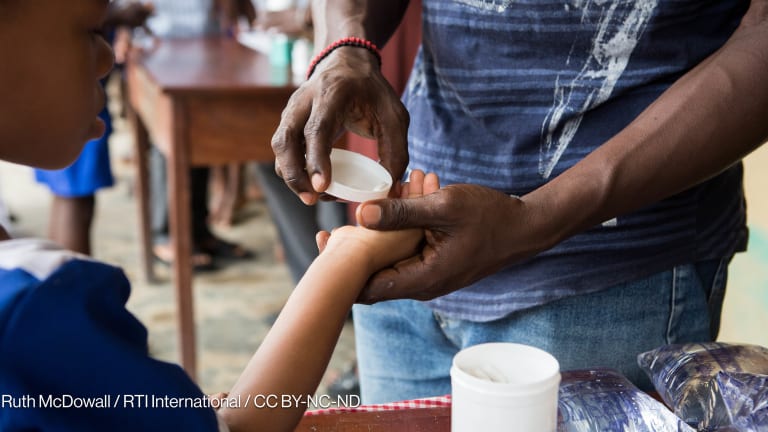
Since the start of the 21st century, global health has become the centerpiece of aid initiatives not only of governments but also of the nonprofit and business sectors. In fact, three of the Millennium Development Goals are health-related: child health, maternal health and HIV/AIDS fight.
Global health, as generally defined, refers to health concerns transcending national borders and whose magnitude has global political and economic significance. Solutions – such as distributing bed nets to prevent malaria, vaccinating against polio, or administering antiretroviral medicines to HIV patients – entail collaborative actions between governments, organizations, communities and individuals.
As United Nations Secretary-General Ban Ki-moon said at a U.N.-sponsored gathering for civil society groups in August 2010, “Partnership will be crucial if we are to end preventable deaths.”
The importance of partnerships
True enough, most of the major global health initiatives bring together public and private sector donors. The Global Fund to Fight AIDS, Tuberculosis and Malaria and the Global Alliance for Vaccines and Immunization are two of the largest public-private partnerships in global health. Both have the support of United Nations agencies, rich governments and the biggest charity focusing on global health, the Bill & Melinda Gates Foundation.
These partnerships provide grants to government ministries and civil society groups to support efforts aimed at preventing or treating diseases. Lately, stakeholders have increasingly focused on strengthening health systems in the developing world, by training doctors and nurses and by providing health services through community and mobile clinics, for instance. Grants range from $100,000 (in the case of GAVI awards for civil society groups) to millions of dollars (particularly for the country coordinating mechanisms for Global Fund-approved programs).
But partnerships in global health may also involve individuals. For instance, the Gates Foundation, since 2003, has been partnering with scientists and entrepreneurs to develop solutions to global health problems. Its Grand Challenges Explorations initiative, which provides $100,000 to winning proposals, is now on its seventh funding round.
Partnerships among implementers
Today, thousands of organizations work in the field of global health. A quick search of the companies and nonprofits database of Devex indicates that more than 1,400 offer goods and expert services related to global health. These include Health Partners International, or HPI, Population Services International, the Elizabeth Glaser Pediatric AIDS Foundation, the International Planned Parenthood Federation, International Medical Corps, and the Global Alliance for Improved Nutrition, or GAIN.
Even among those groups, partnerships play a central role in implementing projects.
In a project lasting from March 2008 to June 2010, for instance, GAIN tapped AED to perform a food consumption survey that would determine dietary patterns among Ugandan women and children.
HPI, meanwhile, is working with Oxford Policy Management, the Mailman School of Public Health at Columbia University, and various regional and national partner organizations to implement the U.K. Department for International Development-funded Mobilizing Access to Maternal Health Services Program in Zambia. The program aims to develop and test effective ways to decrease barriers to accessing maternal health services.
Career opportunities
The increasing demand for global health solutions has made the field attractive to many aid professionals and has prompted many universities in the United States and beyond to offer postgraduate courses in public health, health policy management, immunology and epidemiology.
Some of the largest and most prestigious universities in global health are the Karolinska Institutet in Sweden, University of Oxford in the United Kingdom, Universidad de Barcelona in Spain, Johns Hopkins University in the United States, University of Toronto in Canada, Kyoto University in Japan, Chulalongkorn in Thailand, All India Institute of Medical Science in India, University of the Western Cape in South Africa, and Universidad Nacional de Buenos Aires in Argentina.
For U.S. citizens and non-U.S. nationals attending graduate or postgraduate schools or who have work authorization in the United States, fellowships in global health are available at the U.S. Agency for International Development and several nonprofits, including Catholic Relief Services.
USAID also has a twin internship program for undergraduate and graduate students interested in the field even if they have no background in it. The program enables candidates to be placed either at the agency’s headquarters in Washington, D.C., or overseas to work with local non-governmental organizations and governments on health initiatives.
Such an internship or fellowship coupled with a master’s degree in public health, health administration or health economics provide strong credentials for a career in global health. Those who work in the field generally fall into seven categories: researchers, clinicians, epidemiologists, program managers, program administrators, social marketers and health policy analysts.
To find the latest career opportunities in global health, check the jobs board of Devex. Information on projects and tenders in global health are also just a click away here on devex.com. And don’t forget that as a Devex member, you have the chance to network with thousands of health workers around the globe.
Read more global health news:
Read more global health career advice:
Read more global health business news:








